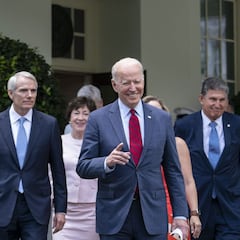$300 unemployment benefit: which states still keep payments?
In a handful of states where the governor hasn’t ended federal unemployment benefits early there are calls from lawmakers for such steps to be taken.

Citing labor shortages due to overly generous unemployment compensation, the governors of more than two dozen states have ended or will end at least one or all of the federal unemployment insurance programs early, nearly all Republican led. In a handful of other states with Democrat governors but Republican-controlled legislatures, Republican lawmakers are pushing to end the $300 weekly unemployment booster.
States are taking different approaches to encourage their residents to go back to work as the economy reopens. Four of the states that are ending participation in the federal programs have opted to give those that reenter the workforce a cash bonus. Many other states have simple reinstated work search requirements instead of dropping the enhanced jobless compensation.
Also see:
- How will May unemployment rates affect extending benefits?
- White House and Senators reach a deal on the bipartisan infrastructure proposal
- US Department of Labor releases state-specific unemployment data for May
- White House responds to fears over labor shortages
Ending enhanced unemployment compensation hasn’t moved people to search for work
The move to end federal unemployment benefits so far hasn’t had the desired effect in the states where participation has ceased. Four states stopped paying the $300 weekly extra to jobless compensation as of 12 June. In those states - Alaska, Iowa, Mississippi and Missouri - the job searches were about four percent less than the national average according to data from the US Bureau of Labor Statistics for May.
Eight other states which ended their participation a week later showed dampened enthusiasm to look for work as well. Alabama, Idaho, Indiana, Nebraska, New Hampshire, North Dakota, West Virginia and Wyoming saw job seeking activity one percent below the national average.
“You’d think they’d be searching more,” Indeed economist AnnElizabeth Konkel told CNBC regarding the job data. “At least right now, this does push back on the idea that federal unemployment benefits are the main reason there are labor market frictions.”
Advocates and economists say Wisconsin’s workforce woes predate the $300 supplemental unemployment payments — and will likely continue to be a problem after it expires. https://t.co/Fuh4qUFBU6
— WPR (@WPR) June 16, 2021
Lawmakers push to end $300 weekly booster to benefits
Three states – Michigan, North Carolina and Wisconsin, now have legislation pending the signature of their respective state’s governor to end the $300 a week in extra unemployment compensation. All three states have Republican-controlled state legislatures and Democrat governors. It is expected that two of the three governors will veto the bills while it isn’t certain if North Carolina Governor Roy Cooper will do so.
The North Carolina bill includes using federal covid-19 relief money to provide subsidies for child care to everyone who is on the waiting list. Child care and paying for it has been one of the major hurdles to getting mothers back into active employment. The bill left out an earlier proposal to offer a $1,500 signing bonus for those who go back to work using federal funds.
A statement from Republican North Carolina Senators Richar Burr and Thom Tillis to Governor Cooper read “The employment shortage caused by exorbitant federal unemployment benefits is a real and serious threat to North Carolina’s recovery.”
More than 200,000 North Carolinians receiving federal unemployment benefits would be affected. https://t.co/ZKsPl5vgKG
— The News & Observer (@newsobserver) June 23, 2021
Lawmakers in Kansas passed a non-binding resolution calling on Governor Laura Kelly to end the $300 weekly extra payment. Governor Kelly is opposed to such a move. Likewise, New Mexico Governor Michelle Grisham received a letter from Republican leaders in the state House of Representatives with a similar request to encourage jobless New Mexicans to return to work. In the case of New Mexico though lawmakers asked for a “one-time $1,200 return-to-work bonus once an unemployed worker has been on the job for a month,” to be created in place of the weekly additional payment.
States without plans to end $300 weekly extra unemployment benefit until September
California, Colorado, Connecticut, Delaware, Hawaii, Illinois, Kentucky, Maine, Massachusetts, Minnesota, Nevada, New Jersey, New York, Oregon, Pennsylvania, Rhode Island, Vermont, Virginia, Washington
Georgia is quitting federal programs this week that pay unemployment benefits to people not usually eligible.
— WTVC NewsChannel 9 (@newschannelnine) June 25, 2021
The state is also quitting a program that pays an extra $300 a week to everyone who gets unemployment.https://t.co/QgeStyEfaF
States that will end one or all enhanced federal unemployment compensation
26 June
- Arkansas, Florida*, Georgia, Texas, Ohio*, Oklahoma, South Dakota, and Utah
27 June
- Montana, Oklahoma
30 June
- South Carolina
3 July
- Maryland, Tennessee
10 July
- Arizona*
Related stories
31 July
- Louisiana*
(*) states that will only end $300 weekly boost to unemployment assistance
- Wisconsin
- North Caroline
- Michigan
- New Mexico
- Kansas
- Unemployment compensation
- Covid-19 economic crisis
- Science
- Unemployment
- Coronavirus Covid-19
- Economic crisis
- United States
- Pandemic
- Coronavirus
- Recession
- North America
- Employment
- Economic climate
- Virology
- Outbreak
- Infectious diseases
- Diseases
- Microbiology
- America
- Medicine
- Biology
- Health
- Life sciences
- Economy


